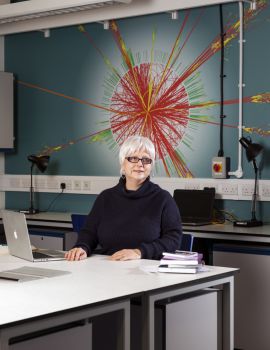Why I care about the Higgs boson
By: Jacqui Bealing
Last updated: Thursday, 31 March 2016

Professor Antonella de Santo (Credit: Travis Hodges)
To coincide with Sussex hosting the Institute of Physics' Joint HEPP and APP conference, 21-23 March 2016, experimental particle physicist Professor Antonella de Santo, who leads the Sussex team involved with the ATLAS experiment at the Large Hadron Collider, reveals what drives new discoveries.
Throughout my career I have been very fortunate to witness several great discoveries – neutrino oscillations in the late nineties, while I was a PhD student, and then a young postdoc working on neutrino physics; and then, after about a decade working on the ATLAS experiment at the Large Hadron Collider, the discovery of the Higgs boson in 2012.
In my heart I always knew I wanted to become a scientist. When I was at school I did rather well in all subjects, but I took particular pride in distinguishing myself in science and maths.
As a student, I used to find particle physics so deeply elegant and satisfying, addressing, as it does, physics phenomena at their most fundamental level. I decided to become an experimentalist rather than a theoretician because I wanted to get as close as I could to data, always in the hope that I would witness the unraveling of new physics phenomena first-hand.
The Higgs boson was the last missing “building block” of the Standard Model of particle physics, which is the best mathematical description of the known fundamental particles and forces of the Universe, with the exception of gravity. The observation of the Higgs boson has confirmed the existence of the so-called Higgs field, which permeates our Universe, and of the Higgs mechanisms, which explains how fundamental particles gain their mass.
Without the Higgs mechanism, the Universe as we know it would not exist. The electrons would have no mass. They would travel at the speed of light and could not be bound into atoms. Without atoms, there would be no stars, no galaxies, no life.
We have only begun to scratch the surface of what we can learn about nature through the analysis of data from the Large Hadron Collider. We are now collecting data at higher energies and with more intense particle beams than ever before. We hope that, once a sufficiently large amount of data has been collected, we can discover new physics phenomena that could change completely our understanding of how the Universe works. If this is not exciting, I don’t know what it is.
